by Becca Stallings
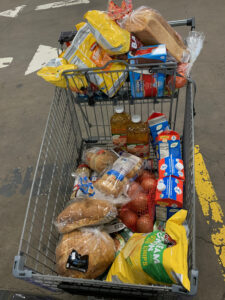 A simple trip to the supermarket has become a very different experience during the COVID-19 pandemic! There are so many new things to think about: wearing a mask, keeping your distance from other customers, following directions for one-way aisles and no-touch payments, keeping your hands away from your face, touching only the things you’re going to buy….
A simple trip to the supermarket has become a very different experience during the COVID-19 pandemic! There are so many new things to think about: wearing a mask, keeping your distance from other customers, following directions for one-way aisles and no-touch payments, keeping your hands away from your face, touching only the things you’re going to buy….
This might not feel like the best time to take up a new habit. Even some of your time-tested strategies for avoiding single-use plastic (SUP) may have become difficult to continue because of changes in stores’ rules, because you’re shopping less selectively in order to minimize the number of stores and frequency of visits, or just because you’re overwhelmed.
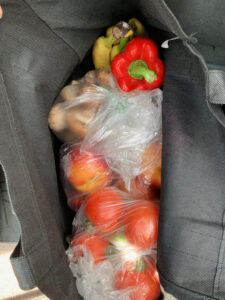 Early in the pandemic, Giant Eagle and some other stores stopped allowing customers to bring in reusable bags for our groceries. Giant Eagle has now amended that policy: You may use your own bags if you use a self-checkout lane.
Early in the pandemic, Giant Eagle and some other stores stopped allowing customers to bring in reusable bags for our groceries. Giant Eagle has now amended that policy: You may use your own bags if you use a self-checkout lane.
The concern is that cloth bags that have been in a customer’s home (typically not washed after every use) and carried on a customer’s shoulder right near the face, may be contaminated with coronavirus, so a cashier handling the bags might be exposed.
As months have gone by and more research on viral transmission has been done, we’ve learned that contaminated surfaces are not a significant source of viral spread. It’s not impossible, but it’s unlikely that a cloth bag–or a grocery item–is so thoroughly covered in viral particles that someone handling the item could be infected by it. Being near infected people is a much larger risk than touching contaminated surfaces.
And to the extent that we are concerned about contaminated surfaces…think about where a store’s SUP bags have been! A big stack of plastic bags is placed into a rack near a cash register, and the cashier (and the bagger, if it’s a separate person) breathe on it for several hours before all the bags are used. The bagger is handling the bags they’ll give you, as well as every one of your grocery items they place into bags.
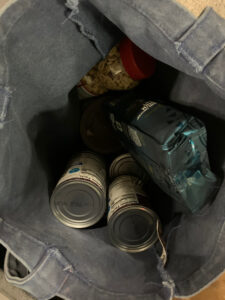
Health experts issued a statement addressing the safety of reusable bags and dishes specifically. They are no more dangerous than disposable products that also have been exposed to the ambient air into which infected people may be coughing or sneezing. However, this statement does support the precaution of having customers handle our own reusable items rather than passing them back and forth with workers.
How to minimize risks with reusable bags
PASUP members shared our strategies for protecting essential workers while avoiding SUP bags and also minimizing the number of breaths we take inside a store!
Use cloth bags, and wash them regularly
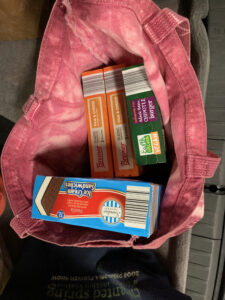 Coronavirus lives longer on plastic than on porous surfaces like cloth or cardboard. Choose reusable bags that are made from cotton canvas or similar fabric, instead of slick plastic, nylon, or that “nonwoven fabric” made from recycled plastic bottles.
Coronavirus lives longer on plastic than on porous surfaces like cloth or cardboard. Choose reusable bags that are made from cotton canvas or similar fabric, instead of slick plastic, nylon, or that “nonwoven fabric” made from recycled plastic bottles.
Another advantage to cloth bags is that they’re easy to clean in the washing machine along with your laundry–whereas plastic bags may fall apart when machine-washed. If you do need to use plastic tote bags, clean them by wiping with rubbing alcohol or hydrogen peroxide on a cloth. (Don’t use vinegar–it kills bacteria but is not effective against coronavirus.)
You don’t have to wash your bags after every use, but make sure to get around to it routinely and whenever bags look dirty.
Reload your cart, then bag in the parking lot
Bagging groceries in the store takes time–you have to give some thought to what’s on the bottom of a bag and whether the item you’re putting on top will squash it; you have to decide when a bag is full, move it aside, and open a new bag. It’s faster to put the groceries back into the cart after scanning. Some stores even use handheld scanners so that groceries can stay in the cart the whole time instead of going onto and off of a conveyor belt.
Simply tell your cashier, “I don’t need bags; I’ll just put everything back into the cart.” This method has worked perfectly for me at several Giant Eagle locations, Target, and Big Lots.
ALDI stores have always used a system of putting scanned groceries into a cart, then directing the customer away from the register to a bagging counter where we can sort and bag our purchases as we’d like. (ALDI also encourages reusable bags by charging customers for every disposable bag they choose to use.)
But if you’re bagging your groceries anywhere inside the store, you’re still in an indoor public space, sharing the air with people who may not notice their COVID-19 symptoms until tomorrow….
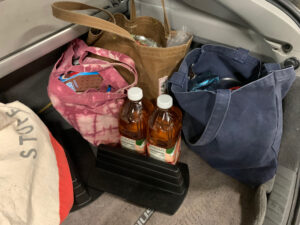
To lower your risk, get out of the store as fast as possible and do your bagging outside in the fresh air! Even if the store has an indoor parking garage, you’ll be farther away from other people than you were in the store.
If you walked, biked, or took public transit to the store, you’ll need to carry your bags into the store and then find an out-of-the-way spot to do your bagging. But if you drove your own car to the store, you can leave your bags in the car (so they aren’t exposed to people’s breath in the store) and fill them in your trunk.
This is so convenient, I’m going to keep doing it after the pandemic ends! I really like being able to sort each type of groceries (frozen, refrigerated, produce, pantry items) into its own bag so that putting things away is simpler!
Other ways to avoid SUP in grocery shopping
- Many items are available in bulk for refilling your reused container at East End Food Co-op. (Although they did not allow refilling early in the pandemic, they’ve resumed allowing it for most foods.)
- The co-op also sells milk in returnable glass bottles.
- When you have a choice between a plastic-wrapped item and an unwrapped or paper-bagged item, avoid the plastic.
- Choose eggs in a cardboard carton (compostable or recyclable) rather than plastic or foam.
- For products available only in plastic packaging, choose the largest size you can use, so that there’s less plastic per unit of food.
- Gordon Food Service has several stores in Pittsburgh’s suburbs. Anyone can shop there–you don’t have to have a restaurant or buy a membership–and you can order online for curbside pickup with no extra packaging! Many foods and household products are available in sizes you could use at home. Read more about GFS here.
- A few food items and many Earth-friendly paper products and cleaners are available by mail order from Green Line Paper in York, PA; the short shipping distance reduces the environmental impact of delivery and means you’ll often get your order in just one or two days!
- When buying produce that isn’t already in a bag, consider getting by without a bag if you’re only buying one or two items of that type. A bell pepper, for example, can just be placed in your cart and then on the conveyor belt. You’re going to wash it before eating, anyway!
- Some stores allow you to use washable produce bags. Where these are not accepted, you may be able to reuse the “disposable” plastic produce bags from a previous visit.
